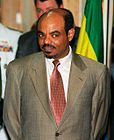Ethiopian general election, 2010
|
|
|||||||||||||||||||||||||
|---|---|---|---|---|---|---|---|---|---|---|---|---|---|---|---|---|---|---|---|---|---|---|---|---|---|
|
|||||||||||||||||||||||||
|
All 547 seats to the House of Peoples' Representatives 274 seats needed for a majority |
|||||||||||||||||||||||||
|
|||||||||||||||||||||||||
|
|||||||||||||||||||||||||
A parliamentary election was held in Ethiopia on May 23, 2010.
The National Election Board of Ethiopia (NEBE) reported that a total of 29,170,867 people were registered to vote in this election. There was a total of 4,525 candidates running for the open positions—which included 546 seats in the House of Peoples' Representatives; 1,349 of whom were members of the ruling Ethiopian People's Revolutionary Democratic Front (EPRDF), 374 members of parties loosely aligned with the EPRDF, 2,798 members of opposition parties, and 4 independent candidates.
The incumbent party EPRDF and opposition parties have signed Election Code of Conduct. They have agreed on time allocation of public media, though the opposition leaders are complaining the time allocated to them saying that it is unfair for the ruling party to take the highest share of the time. Very recently they have started campaign debate that was transmitted on the public television, ETV. One opposition party, the All Ethiopian Unity Party (AEUP), expressed its serious concern and walked out of the debate requesting the debate to be transmitted live and with the presence and in front of the public.
Based on the violence associated with the previous general election, on 13 April 2010 the U.S. State Department issued a travel alert "before and after national parliamentary elections scheduled for May 23, 2010, and recommends against all but essential travel to Ethiopia during this period." The travel alert pointed out that "U.S. citizens [should] ... maintain a high level of security awareness at all times and avoid political rallies, demonstrations, and crowds of any kind. U.S. citizens should avoid polling places on election day, and be aware that authorities will strictly enforce specific prohibitions such as photography at polling stations."
...
Wikipedia

